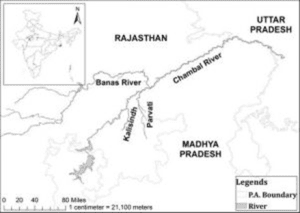TAG: GS 3: AGRICULTURE
THE CONTEXT: The collaborative effort between Rajasthan, Madhya Pradesh, and the Union Ministry of Jal Shakti, marked by the signing of the Memorandum of Understanding (MoU), is a significant step towards implementing the Modified Parbati-Kalisindh-Chambal-ERCP (PKC-ERCP) Link Project.
EXPLANATION:
- This inter-state river linking project holds promise for optimizing water resources and addressing water deficit challenges in the region.
Modified PKC-ERCP Project:
- The Modified PKC-ERCP is an ambitious inter-state river linking project.
- It integrates the long-pending Parbati-Kalisindh-Chambal (PKC) link project with the Eastern Rajasthan Canal Project (ERCP).
- This integration aligns with the national perspective plan of the interlinking of rivers (ILR) program initiated by the Government of India.
- The Parbati-Kalisindh-Chambal (PKC) link project, identified in the National Perspectives Plan since 1980, is a critical component of river interlinking in India.
- It was initially proposed to divert water from the Kalisindh and Newaj rivers to the Chambal.
- The project gained significance when Rajasthan proposed the Eastern Rajasthan Canal Project (ERCP) in 2019.
- The integration of ERCP with PKC was later approved in December 2022.
The Eastern Rajasthan Canal Project (ERCP):
- The ERCP focuses on intra-basin water transfer within the Chambal basin.
- By harnessing surplus monsoon water from Kalisindh, Parvati, Mej, and Chakan subbasins, the ERCP aims to redirect it to water-deficit sub-basins like Banas, Gambhiri, Banganga, and Parbati.
- This strategic water transfer will benefit 13 districts in eastern Rajasthan, providing drinking and industrial water.
Benefits of the Modified Project:
- The Modified PKC-ERCP project is poised to bring substantial benefits to the region.
- The project aims to provide drinking and industrial water in 13 districts of eastern Rajasthan and the Malwa and Chambal regions of Madhya Pradesh.
- Additionally, it targets irrigation in an extensive area, encompassing 2.8 lakh hectares or more in both states, totaling 5.6 lakh hectares or more.
Need for the Memorandum of Understanding (MoU):
- The signing of the MoU between Rajasthan, Madhya Pradesh, and the Union Ministry of Jal Shakti is pivotal.
- It facilitates the implementation of the project by covering essential aspects such as water sharing, exchange mechanisms, cost-sharing, benefits distribution, and management and control arrangements for the Chambal basin.
- The MoU acts as a foundational agreement for the collaborative execution of the Modified PKC-ERCP project.
Overcoming Challenges:
- The project faced challenges related to project planning norms, as the initial Detailed Project Report (DPR) for the ERCP did not align with prevailing standards.
- The Central Water Commission urged Rajasthan to revise the project planning to meet the 75% dependable yield requirement.
- Subsequently, the Task Force on Interlinking of Rivers explored the integration of ERCP with PKC, leading to the formulation of the Modified PKC-ERCP proposal.
- Chambal river:
- It ends in confluence of five rivers, including the Chambal, Kwari, Yamuna, Sind, Pahuj, at Pachnada near Bhareh in Uttar Pradesh state.
- The perennial Chambal originates at Janapav ,south of Mhow town(M.P.)
- It rises in the old Vindhya Range and flows in northeastern direction.
- It flows through three Indian states- Madhya Pradesh, Rajasthan and Uttar Pradesh.
Kalisindh river:
- It rises in the Vindhya Range near Bagli in Dewas district of Madhya Pradesh.
- It joins the Chambal River at Nonera village in Kota district.
Parbati river:
- It rises from the Vindhya range in Sehore district Madhya Pradesh.
- Falls into Chambal River in Sawai Madhopur District.

Conclusion:
- The collaborative effort represented by the MoU and the Modified PKC-ERCP project signifies a strategic approach to water management and inter-state cooperation.
- As the project progresses, it is poised to address water scarcity issues, boost agricultural productivity, and contribute to the sustainable development of the region.
- This initiative showcases the potential of interlinking river projects in tackling complex water challenges across states in India.

